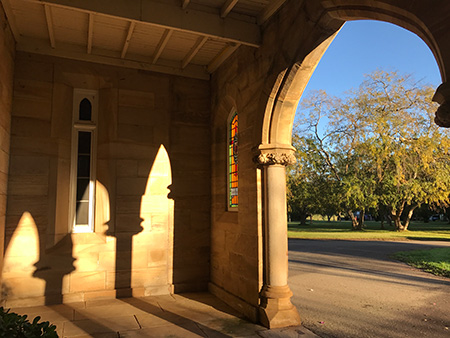 A reflection on the readings for the sixth Sunday of Easter We have reached the climax of Jesus’ farewell speech to his disciples. Three times Jesus insists on covenant love as being the essential response required of us: ‘If you love me you will keep my commandments’(14:15). ‘The one who receives my commandments and keeps them is the one who loves me’(14:21). ‘Those who love me will keep my word’(14:23). Three times he assures us that we will not be left alone: ‘I will ask the Father and he will give you the Spirit to be with you for ever’(14:16). ‘I will come back to you ... I will show myself to you’(14:18,21). ‘My Father and I will come to you and make our home in you’(14:23). Each time he assures his disciples that this intimate communion with the Spirit, with himself, and with the Father is something that those who reject him (‘the world’) cannot experience. It is a communion possible only for those who respond in love to what God is offering.
A reflection on the readings for the sixth Sunday of Easter We have reached the climax of Jesus’ farewell speech to his disciples. Three times Jesus insists on covenant love as being the essential response required of us: ‘If you love me you will keep my commandments’(14:15). ‘The one who receives my commandments and keeps them is the one who loves me’(14:21). ‘Those who love me will keep my word’(14:23). Three times he assures us that we will not be left alone: ‘I will ask the Father and he will give you the Spirit to be with you for ever’(14:16). ‘I will come back to you ... I will show myself to you’(14:18,21). ‘My Father and I will come to you and make our home in you’(14:23). Each time he assures his disciples that this intimate communion with the Spirit, with himself, and with the Father is something that those who reject him (‘the world’) cannot experience. It is a communion possible only for those who respond in love to what God is offering.
This is the last night of Jesus’ life. He has a mission from God his Father to reveal who God really is to the world. He does so by his love. Now he is calling us to carry on this mission. Jesus loved with the love that he received from his Father. ‘As the Father has loved me, so I have loved you; abide in my love’(15:9). That we might be able to love in the same way, Jesus promises to dwell with his Father and the Spirit in our hearts. He consecrates us so that we will indeed be a temple where the Blessed Trinity abides.
John speaks of this firstly as an experience of the Spirit: an experience of being drawn into the communion of love which Jesus himself experienced. John has been preparing us for the coming of the Spirit from the beginning of his Gospel. When Jesus was first introduced by John the Baptist he was introduced as the one who ‘baptises with the Holy Spirit’(1:33). Jesus told Nicodemus that he would need to be ‘born of the Spirit’ (3:8), for it is the Spirit who ‘gives life’(6:63). Jesus will pour forth this love-Spirit from his pierced heart on the cross (19:34), and after the resurrection, from the depths of his communion with God his Father, he breathes on his disciples and says: ‘Receive the Holy Spirit’(20:22).
Jesus has continued to pour his Spirit into the hearts of those who come to him. We see this in today’s First Reading. This is the gift which we received when we were initiated into the Christian community in Baptism, Confirmation and the Eucharist. It is the gift that we are to receive again today. And so the Church invites us in today’s Responsorial Psalm to cry out with joy and to proclaim the marvels that God has done for us.
Saint Paul often speaks of this amazing truth: that we are the sacred place where God has chosen to dwell: ‘Do you not know that your body is a temple of the Holy Spirit within you, which you have from God?’(1Corinthians 6:19). ‘Because you are children, God has sent the Spirit of his Son into our hearts, crying, “Abba! Father!”’(Galatians 4:6). ‘God’s love has been poured into our hearts through the Holy Spirit that has been given to us’(Romans 5:5). ‘If Christ is in you ... If the Spirit of him who raised Jesus from the dead dwells in you, he who raised Christ from the dead will give life to your mortal bodies also through his Spirit that dwells in you’(Romans 8:10-11).
Having spoken of the indwelling of the Holy Spirit, John goes on to assure us that in experiencing this indwelling of the Holy Spirit we will be experiencing Jesus’ continued communion with us. Jesus is about to die, but his Father’s ‘little children’(13:33) will not be left orphans. We will watch him die, but he will continue to live (5:26; 6:57), and we will live with his life.
Paul writes: ‘It is no longer I who live, but it is Christ who lives in me’(Galatians 2:20). We are ‘saved by his life’(Romans 5:10). We are ‘made alive in Christ’(1Corinthians 15:22). Jesus has already spoken of his being in the Father and the Father being in him (see 10:38; 14:10,11). Now he adds: ‘and you in me and I in you’. The life that Jesus came to give consists in sharing with him in the intimate communion which he enjoys with the Father (see 6:56-57; 14:3).
Once again, love is the condition for experiencing this intimate communion. This is not because God’s offer of love is conditional. It is because we can receive love only in love. It is our receiving that is conditional upon our love, not God’s giving. Jesus goes on to assure his disciples that he and the Father will come and make their home with whoever believes in him – the invitation is open to all. Jesus began this discourse by speaking of the many dwelling places he was preparing. Here we learn that these dwelling places are the hearts and souls of his disciples that Jesus, in his love, is preparing to be homes for the indwelling of God.
Jesus’ mission is to reveal the Father. The Holy Spirit’s mission is to deepen the disciples’ understanding of Jesus’ revelation and to keep them faithful to it. This is achieved by our being continually drawn by the Spirit into the embrace that unites Jesus and the God he calls ‘Father’ in a communion which is Jesus’ incarnate experience of the union between the Word and God – a union in which the very being of God consists (see 1:1-2).
Every human being is sacred, because everyone is made in the image of God. If this is true of every human being, how we should marvel at what is happening in the soul of one whose heart is open to welcome Jesus and his Father and the Spirit that is their bond of love? This is the fullness of life that Jesus came to offer to the human race.
Let us listen to Saint John of the Cross. In his Spiritual Canticle (1,7) he writes: ‘O most beautiful of creatures, transcendent spirit, who long to know where your beloved is and where you may find him so as to be united with him. He dwells within you. You are yourself the tabernacle, his secret hiding place. Rejoice, exult, for all you could possibly desire, all your heart's longing is so close, so intimate as to be within you; you cannot be without him.’ In his Living Flame (3:9), he writes: ‘The soul is like the air within a flame, enkindled and transformed in the flame, for the flame is nothing but enkindled air.’
In one of his Romances (4:15-17), he speaks of Jesus as the Bridegroom and of us as the bride. He writes: ‘He would take his bride tenderly in his arms, and there give her his love. And when they were thus one, He would lift her to the Father, where God’s own joy would be her joy. For as the Father and the Son and He who proceeds from them live in one another, so it would be with the bride. For, taken wholly into God, she will live the life of God.’
So it is that Saint Peter begins today’s Second Reading with the words: ‘Reverence the Lord Jesus in your hearts.’
Michael Fallon msc



